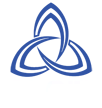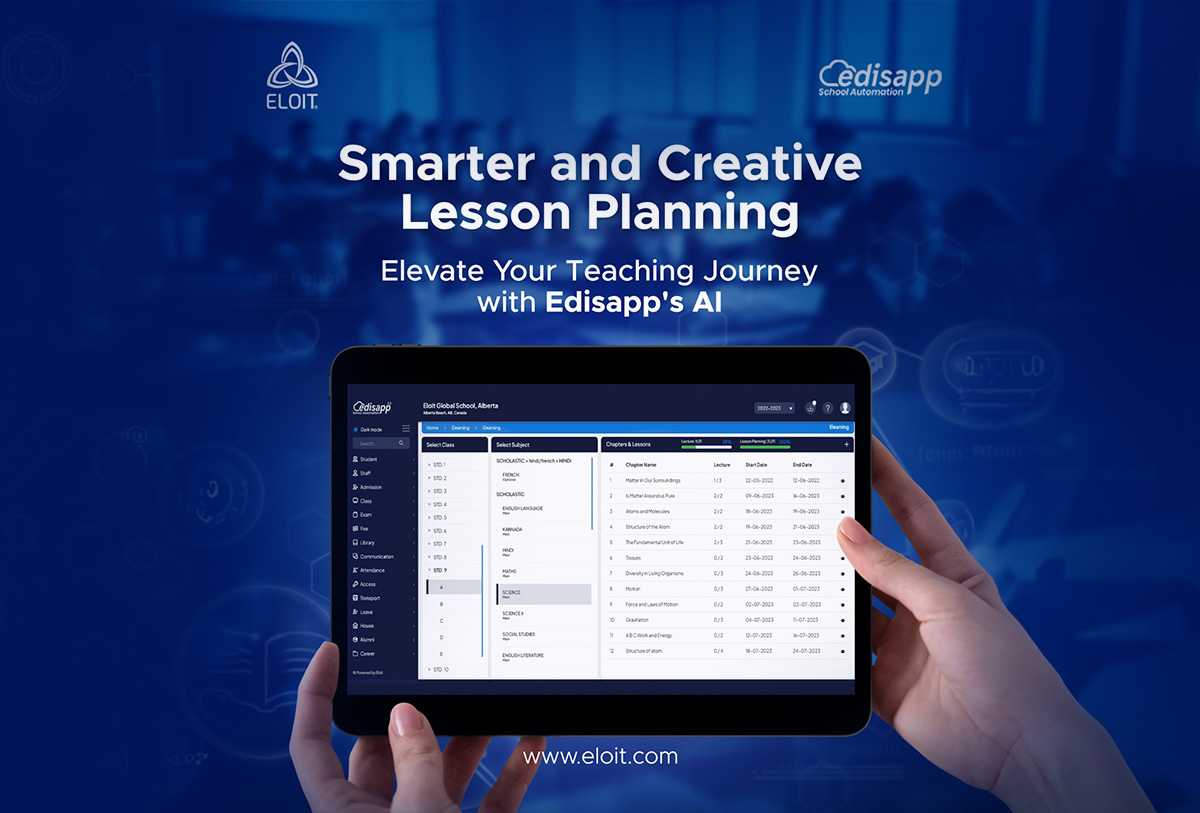Free Demo
Revolutionising Education: Edisapp's AI-Driven Approach to Lesson Planning
Introduction: A New Era in Education In an age defined by technological transformation, the field of education is experiencing significant shifts. Eloit Innovations, a renowned leader in edtech, introduces Edisapp, an innovative School ERP and LMS designed to reshape traditional educational practices. Amongst its standout features is the AI-assisted comprehensive lesson planning, which notably changes the way educators prepare and deliver lessons.
The Need for Advanced Lesson Planning Effective lesson planning is crucial for quality education. Crafting a solid lesson plan involves meticulously combining objectives, activities, and assessments. While traditional methods have been effective, they can be time-consuming and may limit an educator's ability to consistently create engaging lessons. Hence, there is a need for a revolutionary approach.
Edisapp's Cutting-Edge Solution Edisapp employs AI to streamline and enhance lesson planning. By utilising intelligent algorithms, Edisapp assists educators in effortlessly integrating diverse educational elements. This not only simplifies the process but also paves the way for enriched learning experiences.
Features of Edisapp's AI-Enabled Lesson Planning
- AI-Powered Lesson Planner: Edisapp's AI provides smart, data-driven suggestions for creating resonating lessons.
- Content Creator: Allows educators to create course material in line with the curriculum.
- Chapter Manager: Simplifies academic content organisation.
- Lesson Progress Tracker: Monitors and analyses lesson progress in real-time.
Benefits Realised Through Edisapp's AI
- Streamlined Processes: Edisapp automates tasks, ensuring educators focus more on teaching.
- Unleashed Creativity: Educators can infuse creativity into each lesson.
- Enhanced Efficiency: Edisapp brings agility to lesson planning.
Examining Lesson Planning Components: A Cambridge Curriculum Perspective
Learning Objectives Learning objectives are the foundation of a lesson plan, providing clear direction for educators and students alike. These objectives are clear statements outlining the expected knowledge or skills to be gained. By clearly stating the expected outcomes, learning objectives guide educators in designing their lesson and help students understand their learning goals.
Example: Take a lesson on "Matter in Our Surroundings." A clear learning objective could be: "By the end of this lesson, students will identify and classify different states of matter and explain their properties."
Contextual Background The contextual background in a lesson plan explains how the lesson fits into the broader unit or subject area. It helps students see the relevance of what they're learning.
Example: A lesson on "Matter in Our Surroundings" would note that understanding states of matter is basic knowledge for subsequent lessons on chemical reactions and molecular structures.
Resources and Materials Carefully selected textbooks, digital content, and additional resources enrich a lesson plan, illustrating and supporting the teaching material.
Example: For a lesson on "Matter in Our Surroundings," resources could include textbooks, multimedia presentations on states of matter, and hands-on experiments.
Teaching Methodology The teaching methodology includes strategies and methods used to deliver the lesson content and is tailored to facilitate the achievement of learning objectives.
Example: To teach "Matter in Our Surroundings," educators might use an interactive discussion on states of matter, followed by demonstrations and practical experiments.
Student Activities Interactive tasks and exercises designed to engage students and promote understanding of the lesson content are crucial for fostering active participation and deepening comprehension.
Example: In a lesson on "Matter in Our Surroundings," students might classify objects into solids, liquids, and gases and conduct experiments to observe the properties of each state.
Assessment and Evaluation Tools and criteria to gauge students' understanding and progress can include quizzes, oral presentations, and practical evaluations.
Example: After a lesson on "Matter in Our Surroundings," an assessment might include a quiz on the properties of different states of matter and an evaluation of the experiments conducted.
Homework and Assignments Follow-up tasks reinforce learning and enable students to apply concepts independently.
Example: After the lesson on "Matter in Our Surroundings," students could be given a research task on the application of knowledge of states of matter in daily life.
Differentiation Strategies are employed to tailor instruction to meet diverse learning needs, ensuring all students can engage with the learning material.
Example: In a lesson on "Matter in Our Surroundings," differentiation might include tailored explanations and activities catering to varied learning speeds and styles.
Reflection and Feedback Opportunities for students to assess their understanding and receive constructive input from educators are provided.
Example: After exploring "Matter in Our Surroundings," students could reflect on their understanding while teachers provide feedback on their experiments and participation.
Tabular Lesson Plan: A Quick Overview
| Component | Description |
|---|---|
| Learning Objectives | Students will identify and classify different states of matter and explain their properties. |
| Contextual Background | The lesson forms the foundation for understanding chemical reactions and molecular structures. |
| Resources and Materials | Textbooks, multimedia presentations, hands-on experiments. |
| Teaching Methodology | Interactive discussion, demonstrations, practical experiments. |
| Student Activities | Classifying objects into solids, liquids, and gases; conducting experiments. |
| Assessment and Evaluation | Quiz on properties of different states of matter; evaluation of experiments. |
| Homework and Assignments | Research task on application of knowledge of states of matter in daily life. |
| Differentiation | Tailored explanations and activities for varied learning speeds and styles. |
| Reflection and Feedback | Opportunities for self-assessment and teacher feedback. |
Why Choose Edisapp? Edisapp stands as a steadfast companion in the teaching journey, ensuring lessons are optimally structured and delivered.
Conclusion: Elevating Global Education Edisapp embodies Eloit Innovations' commitment to empowering education globally. By integrating AI into lesson planning, Edisapp provides educators with essential tools for quality education while adapting to the dynamic academic landscape.
Experience Edisapp Today Witness the revolutionary impact of Edisapp on your teaching journey. Request a Free Demo Today.
Tags: #Edisapp #EloitInnovations #AI #LessonPlanning #QualityInEducation #EmpoweringEducationGlobally #InnovativeTeaching

